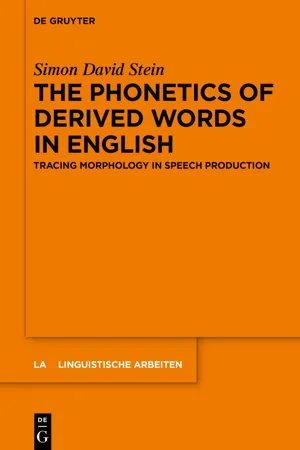
The Phonetics of Derived Words in English
Tracing Morphology in Speech Production
- 238 pages
- English
- ePUB (mobile friendly)
- Available on iOS & Android
About this book
Effects of morphological structure on phonetic detail present us with two challenges. The empirical challenge is that some predictors have produced inconsistent effects. The theoretical challenge is that it is unclear where morpho-phonetic effects originate from. Do speakers decompose words into morphemes? Or can such effects also originate from non-decompositional structure?
This book investigates the durational properties of English derived words in four large-scale corpus studies. In the decompositional perspective, durations are modeled as a function of frequency and segmentability, prosodic structure, and affix informativeness. In the non-decompositional perspective, durations are modeled with predictors derived from linear discriminative learning networks.
Results show that the decompositional predictors are far less reliable than previously thought. Meanwhile, some non-decompositional predictors model durations successfully. Discriminative learning is shown to be a promising alternative for modeling speech production. However, the book also demonstrates that many investigated predictors are conceptually interrelated. It ultimately cautions against taking the metaphors we use to describe these predictors as final explanations.
Frequently asked questions
- Essential is ideal for learners and professionals who enjoy exploring a wide range of subjects. Access the Essential Library with 800,000+ trusted titles and best-sellers across business, personal growth, and the humanities. Includes unlimited reading time and Standard Read Aloud voice.
- Complete: Perfect for advanced learners and researchers needing full, unrestricted access. Unlock 1.4M+ books across hundreds of subjects, including academic and specialized titles. The Complete Plan also includes advanced features like Premium Read Aloud and Research Assistant.
Please note we cannot support devices running on iOS 13 and Android 7 or earlier. Learn more about using the app.
Information
Table of contents
- Title Page
- Copyright
- Contents
- Acknowledgements
- List of figures
- List of tables
- 1 Introduction
- 2 Storing and processing derived words
- 3 General method
- 4 Frequency measures
- 5 Prosodic word integration
- 6 Affix informativeness
- 7 Linear discriminative learning
- 8 General discussion
- 9 Conclusion
- Index